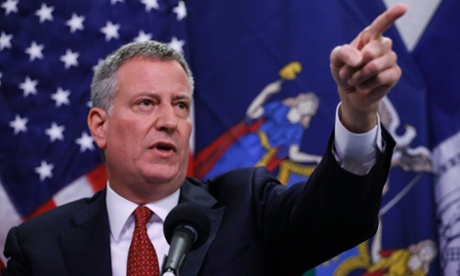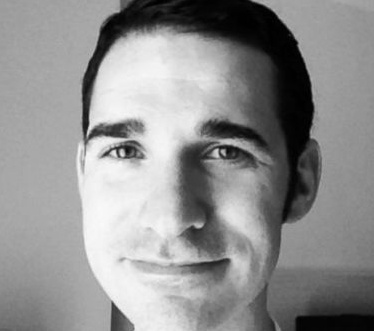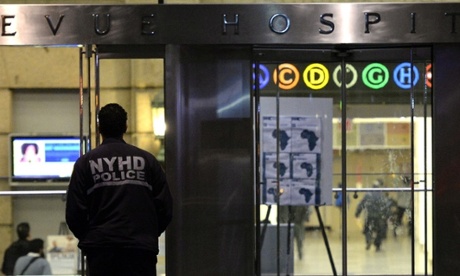 |
| New York mayor Bill de Blasio at a press conference on Friday: ‘ |
A privately contracted crew of environmental and hazardous material cleaners arrived at the apartment that Craig Spencer, 33, shared with his fiancee Morgan Dixon.
Spencer, who had worked for Doctors Without Borders in Guinea, was being treated in an isolation unit at Bellevue hospital in the city, where he was taken after displaying symptoms consistent with those caused by Ebola, including a fever of 100.3F (38C).
Officials are monitoring four people with whom Spencer had contact. His fiancee and two friends have been quarantined, while the fourth person, a taxi driver, was not considered to be at risk.
Spencer had finished his work in Guinea, one of the three west African countries worst affected by the virus, on 12 October and left the country on 14 October, flying home to John F Kennedy airport in New York via Europe. He arrived in New York on 17 October.
More details emerged on Friday about Spencer’s movements in the city before he was diagnosed. On Tuesday, he visited the High Line park where he stopped at the Blue Bottle coffee stand, and ate at the Greenwich Street branch of the Meatball Shop restaurant.
On Wednesday, he took a three-mile jog on Riverside Drive, near his home, rode the subway to the Gutter bowling alley in the Williamsburg area of Brooklyn and took an Uber cab home, all before he began to display symptoms, officials said.
The mayor of New York, Bill de Blasio, urged New Yorkers not to be concerned. “There is no reason for New Yorkers to change their daily routine in any way,” he said, stressing that Ebola is very difficult to contract. “It cannot be transmitted through casual contact, it cannot be transmitted through an airborne fashion,” De Blasio said.
Officials described Spencer as a meticulous individual who had been carefully monitoring himself after returning from Guinea.
Spencer began to feel feverish on Thursday between 10am and 11am. He contacted Doctors Without Borders immediately, which in turn contacted the New York department of health. Officials organised for him to be transported to Bellevue hospital in the city, a designated site for Ebola patients, under strictly controlled conditions.
Authorities emphasised that it was unlikely he would have been infectious before that time. Humans are not infectious until they display symptoms.
Healthcare workers at Bellevue are using a full protective gear, Mary Bassett, New York City department of health and mental hygiene commissioner, said during a press conference at the hospital on Thursday. None of the staff opted out of treating Spencer even though they were given an opportunity to do so.
Camera crews and reporters were gathered outside Spencer’s apartment building in the Harlem neighbourhood of Manhattan on Friday morning. Two officers from the city’s environmental police entered a gate to the side of the building and locked it behind them.
Mark Levine, the area’s city councilman, was on the sceneto try to reassure Spencer’s neighbours that they were safe. Levine said that no one, including police, had been inside Spencer’s fifth-floor apartment since the doctor was taken to hospital. “I understand he actually left the key inside deliberately,” said Levine.

The city councilman stressed to Spencer’s neighbours that none of them were in danger of contracting Ebola. “It’s not an airborne virus and it doesn’t live on surfaces for very long, so even if he touched an elevator button or doorknob, there’s no risk of contamination,” he was telling people in the neighbourhood.
Workers from the city department of health canvassed Spencer’s building and every other building on the block on Thursday evening with bilingual pamphlets containing information about the virus. Levine said a new team of 20 staff were due to arrive to canvass nearby bus stops, grocery stores and subway entrances to speak to passersby in English, French and Spanish.
Some were unconvinced. “This entire neighbourhood is worried,” said Stan Malone, who said he lived across West 147th Street from Spencer. “People want to know why they haven’t quarantined his entire building yet. Ebola is here in the city and you can bet this won’t be the last case.”
Malone said he had an aunt, an uncle and two cousins who lived two floors away from Spencer in the same building. The relatives, whom he declined to name, moved to a hotel yesterday, he said, and want to be tested for the virus today.
“There’s a lot of misconception out there, and people are scared understandably,” said Levine, the councilman. “But they have to understand that you don’t catch this by walking by someone or sitting next to them on the subway or jogging by them in the park.”
Levine said one neighbour of Spencer’s had even refused to shake the city councilman’s hand in case he, too, was infected with Ebola. “It’s absurd, but we’re trying to educate people,” said Levine.
Ebola: New York officials urge calm as cleanup begins at patient's home

A privately contracted crew of environmental and hazardous material cleaners arrived at the apartment that Craig Spencer, 33, shared with his fiancee Morgan Dixon.
Spencer, who had worked for Doctors Without Borders in Guinea, was being treated in an isolation unit at Bellevue hospital in the city, where he was taken after displaying symptoms consistent with those caused by Ebola, including a fever of 100.3F (38C).
Officials are monitoring four people with whom Spencer had contact. His fiancee and two friends have been quarantined, while the fourth person, a taxi driver, was not considered to be at risk.
Spencer had finished his work in Guinea, one of the three west African countries worst affected by the virus, on 12 October and left the country on 14 October, flying home to John F Kennedy airport in New York via Europe. He arrived in New York on 17 October.
More details emerged on Friday about Spencer’s movements in the city before he was diagnosed. On Tuesday, he visited the High Line park where he stopped at the Blue Bottle coffee stand, and ate at the Greenwich Street branch of the Meatball Shop restaurant.
On Wednesday, he took a three-mile jog on Riverside Drive, near his home, rode the subway to the Gutter bowling alley in the Williamsburg area of Brooklyn and took an Uber cab home, all before he began to display symptoms, officials said.
The mayor of New York, Bill de Blasio, urged New Yorkers not to be concerned. “There is no reason for New Yorkers to change their daily routine in any way,” he said, stressing that Ebola is very difficult to contract. “It cannot be transmitted through casual contact, it cannot be transmitted through an airborne fashion,” De Blasio said.
Officials described Spencer as a meticulous individual who had been carefully monitoring himself after returning from Guinea.
Spencer began to feel feverish on Thursday between 10am and 11am. He contacted Doctors Without Borders immediately, which in turn contacted the New York department of health. Officials organised for him to be transported to Bellevue hospital in the city, a designated site for Ebola patients, under strictly controlled conditions.
Authorities emphasised that it was unlikely he would have been infectious before that time. Humans are not infectious until they display symptoms.
Healthcare workers at Bellevue are using a full protective gear, Mary Bassett, New York City department of health and mental hygiene commissioner, said during a press conference at the hospital on Thursday. None of the staff opted out of treating Spencer even though they were given an opportunity to do so.
Camera crews and reporters were gathered outside Spencer’s apartment building in the Harlem neighbourhood of Manhattan on Friday morning. Two officers from the city’s environmental police entered a gate to the side of the building and locked it behind them.
 |
The city councilman stressed to Spencer’s neighbours that none of them were in danger of contracting Ebola. “It’s not an airborne virus and it doesn’t live on surfaces for very long, so even if he touched an elevator button or doorknob, there’s no risk of contamination,” he was telling people in the neighbourhood.
Workers from the city department of health canvassed Spencer’s building and every other building on the block on Thursday evening with bilingual pamphlets containing information about the virus. Levine said a new team of 20 staff were due to arrive to canvass nearby bus stops, grocery stores and subway entrances to speak to passersby in English, French and Spanish.
Some were unconvinced. “This entire neighbourhood is worried,” said Stan Malone, who said he lived across West 147th Street from Spencer. “People want to know why they haven’t quarantined his entire building yet. Ebola is here in the city and you can bet this won’t be the last case.”
Malone said he had an aunt, an uncle and two cousins who lived two floors away from Spencer in the same building. The relatives, whom he declined to name, moved to a hotel yesterday, he said, and want to be tested for the virus today.
“There’s a lot of misconception out there, and people are scared understandably,” said Levine, the councilman. “But they have to understand that you don’t catch this by walking by someone or sitting next to them on the subway or jogging by them in the park.”
Levine said one neighbour of Spencer’s had even refused to shake the city councilman’s hand in case he, too, was infected with Ebola. “It’s absurd, but we’re trying to educate people,” said Levine.
Cuomo drew a comparison with the response to an outbreak in Dallas, Texas, where the city’s principal hospital bungled its initial contacts with an Ebola patient who later died, Thomas Duncan.
“I know it’s a frightening situation, I know when you watched it on the news and it was about Dallas it was frightening; that it’s here in New York is more frightening,” Cuomo said. “New York is a dense place, a lot of people are on top of each other. But the more facts you know, the less frightening the situation is.”
Federal officials at the Centers for Disease Control and Prevention (CDC), which has sent a team to New York City to assist city and state officials in the response, will carry out a further test to confirm Spencer’s preliminary diagnosis.
Barack Obama spoke by telephone with Cuomo and De Blasio about the positive test, the White House said, and discussed the deployment of officials from the CDC.
Spencer’s case is the first test of a newly created Ebola response team, ordered by Obama after the Dallas case where Duncan, a Liberian, was sent home after his first visit to an emergency room, despite having a fever and reporting that he had been to west Africa. Two nurses caring for him became infected: both have now been declared free of Ebola.
The case is also a test of New York City’s public health system, described by De Blasio as the “world’s strongest”.

As required by MSF guidelines, Spencer monitored his own temperature twice a day. Officials said he took care to limit his exposure to other people, although did not offer an explanation of why he visited a bowling alley and went jogging.
“Extremely strict procedures are in place for staff dispatched to Ebola affected countries before, during, and after their assignments,” said Sophie Delaunay, executive director of MSF. “Despite the strict protocols, risk cannot be completely eliminated. However, close post-assignment monitoring allows for early detection of cases and for swift isolation and medical management.”
No comments:
Post a Comment